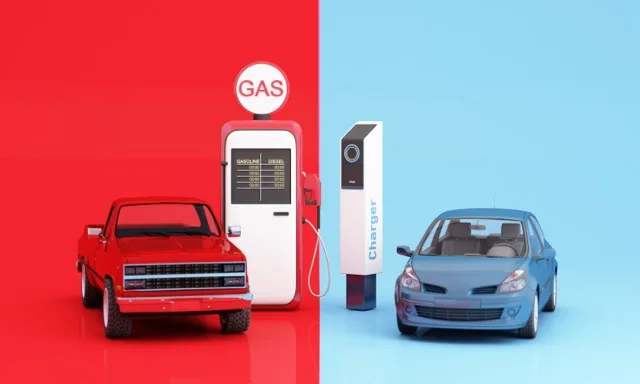As of 2023, the electric car industry has celebrated significant accomplishments, selling more than 10 million electric vehicles (EVs) globally. Australia has also seen an increase in EV adoption, with almost 44,000 electric vehicles sold YTD. This includes 36,540 Battery Electric Vehicles and 7,380 plug-in hybrid vehicles. People’s desire to embrace eco-friendliness, save on fuel expenses, and make a positive contribution to a greener future has led to the recent increase in the popularity of sustainable transportation. However, with the market expanding, choosing between fully electric cars, hybrid models, and plug-in hybrids has become more daunting. This blog post aims to clarify the differences between these options and assist you in making the best decision based on your needs and preferences.
Difference Between Electric and Hybrid Cars
Electric vehicles (EVs) rely solely on electric motors for power, which they obtain from rechargeable batteries made up of cell modules such as lithium-ion (Li-ion) or Lithium-Iron Phosphate. On the other hand, hybrid cars combine a traditional internal combustion engine with an electric motor. Hybrid models use regenerative braking to recharge the electric motor and work together with the combustion engine to move the vehicle forward.
Popular BEVs available in Australia
- Tesla Model Y: From $65,400
- BYD Atto 3 Standard: From $48,000
- Polestar 2: From $63,900
- Volvo XC40: From $53,490
Decoding Hybrid Cars
Hybrid vehicles are aptly named as they bring together the benefits of electric and traditional gas-powered cars. They consist of a large battery pack (typically between 1 to 9 kWh) powering the electric motor and a smaller 12V battery for ancillary functions like lights and stereo. It’s important to note that each manufacturer designs their hybrid models differently, leading to variations in performance and features.
Hybrids cars in Australia
- Toyota Corolla: From $29,270
- Kia Niro: From $41,710
- Lexus NX: From $61,900
- Honda HR-V: From $36,700
What are Plug-in Hybrids?
Plug-in hybrids offer a step forward in hybrid car technology, allowing drivers to charge their vehicles like fully electric cars. The plug-in hybrids present a good middle ground as they mainly rely on electric power until the battery’s range is exhausted, and then they switch over to the internal combustion engine. If you’re not quite ready for the full commitment of electric cars but still interested, plug-in hybrids are a great option.
Plug-ins Hybrids in Australia
- Ford Escape PHEV: From $36,490
- MG HS PHEV: From $49,990
- Mitsubishi Eclipse Cross PHEV: From $31,490
- Volvo XC60: From $72,990
Comparing the Pros and Cons of Hybrids and EVs
- Purchase Price: Electric vehicles (EVs) and hybrids are typically more costly than traditional gasoline cars, but their prices have gradually decreased over time. In general, hybrids are less expensive than EVs, but with a wider selection of options available, there are budget-friendly EV choices as well, particularly with various government incentives specifically for EVs.
- Range: Hybrid cars can travel hundreds of kilometres before needing to refuel, while EVs’ ranges have significantly improved but still may not match internal combustion engines. For daily commuting, electric power is often sufficient, but for longer trips, hybrids may be more convenient.
- Fuel Cost: Electric cars are substantially cheaper to run than hybrids that rely on gasoline. EVs’ low electricity cost (around $0.25 per kWh in Australia) outperforms the fuel costs of hybrids, offering significant savings in the long run.
- Maintenance: EVs require minimal maintenance due to fewer moving parts, making them more cost-effective and hassle-free compared to hybrids that have combustion engines. Studies indicate that EV maintenance costs are approximately 33% less than plug-in hybrids.
- Driving Experience: EVs provide a unique and enjoyable driving experience with their silent operation, smooth acceleration, and absence of manual gear shifts. Hybrids offer similar benefits during short trips when running on electric power.
- Environmental Impact: Although both EVs and hybrids contribute to reducing greenhouse gas emissions, EVs are undoubtedly the more sustainable option. Hybrid cars may have a higher environmental impact, especially during long journeys relying on fuel consumption.
Which one should you pick? EVs or Hybrids
When deciding between fully electric cars, hybrids, and plug-in hybrids, there are important factors to consider such as purchase price, range, fuel cost, maintenance, driving experience, and environmental impact.
If you’re seeking an affordable and eco-friendly option that requires minimal upkeep, an EV may be the best choice for your daily commute. However, if you require a greater range and still want to reduce emissions, a hybrid or plug-in hybrid may be a good compromise.
Ultimately, your decision should depend on your driving habits, budget, and commitment to embracing green technology. Regardless of your choice, both EVs and hybrids are leading the way towards a cleaner and more sustainable future for transportation in Australia and beyond.
Please Note: Prices mentioned above are Based on Manufacturer’s Suggested Retail Price (MSRP) and are subject to change.

